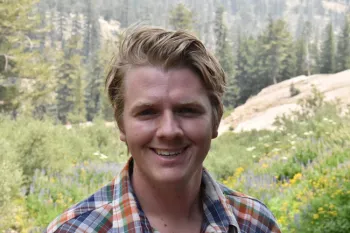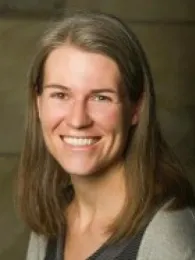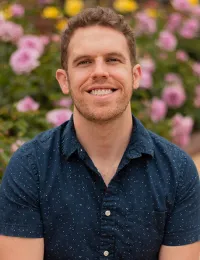
Jacob “Jake” Francis, a member of the Vannette lab since 2020, received a National Science Foundation (NSF) Postdoctoral Research Fellowship in Biology (PRFB) to study secondary metabolites in nectar and their consequences for microbes and pollinators. His project is titled “Genetic Signal and Ecological Consequences of Toxic Nectar in Plant-Pollinator Microbe Interactions.”
Jacob “Jake” Cecala, who just received his doctorate from UC Riverside and will join the Vannette lab this fall, received a postdoctoral fellowship granted by the USDA's National Institute of Food and Agriculture to study the effects of water availability and pesticide use on bees and bee-microbe associations.

Jacob 'Jake' Francis
“Plants produce complex suites of chemicals in their vegetation and flowers that impact ecological interactions with herbivores, microbes, and pollinators,” Francis explained in his application. “These plant-produced chemicals are important to human society; they can be poisonous to livestock, mediate crop disease, and offer natural chemical libraries for drug discovery. While the consequences of these compounds in vegetative tissues has been extensively studied, much less is known about how specialized chemicals in pollen and nectar impact plants' interactions with pollinators and flower-inhabiting microbes.”
“Many flowers harbor communities of beneficial and/or pathogenic fungi and bacteria that can impact pollinator behavior and health,” Francis pointed out. “Through a combination of genomic studies, manipulative experiments, and simulation modeling, this postdoctoral project will test the link between plant genomes, specialized chemistry, floral microbiome, and pollinator behavior.”
Francis will focus on a highly bioactive class of nectar compounds, pyrrolizidine alkaloids, produced by the naturalized non-native plant purple viper's bugloss, Echium plantagineum. He will characterize the alkaloid content of the nectar and vegetation of 150 plants across three populations.
His NSF grant involves collecting and isolating nectar microbes from Echium and co-flowering species and testing whether Echium-collected microbes are better able to grow in the presence of toxic alkaloids than other nectar microbes. Francis also will test how microbial growth and nectar alkaloid content interactively impact nectar consumption by bumblebees. Throughout this process, he will receive extensive training in microbiological and genetic techniques from his sponsoring scientists, assistant professor Rachel Vannette and Daniel Kliebenstein, a professor in the UC Davis Department of Plant Sciences.
Francis received his doctorate in 2020 from the University of Nevada, Reno, working with advisor Anne Leonard of the Department of Biology's Program in Ecology, Evolution and Conservation Biology. He holds a bachelor's degree from the University of North Carolina Asheville (2011) in ecology and evolution, summa cum laude, with distinction as both a research scholar and an honors scholar.
Active in the Ecological Society of America (ESA), Francis delivered an invited presentation at ESA's 2021 meeting on “Pollinator Nutrition from a Plant's Eye View: Floral Reward Macronutrients Predict Patterns of Pollen Movement in a Co-Flowering Plant Community.” Francis is also interested in sharing the excitement of entomology with students: At ESA's 2011 meeting, he presented at an organized session on “Pair Power Collaboration with ESA's Next Generation of Ecologists (undergraduates) as Evidence of Earth Stewardship.” He has also delivered presentations at the Entomological Society of America meetings.
Francis most recently has co-authored research on “Microbes and Pollinator Behavior in the Floral Marketplace” in Current Opinions in Insect Science; and has published in journals such as Current Biology and Behavioral Ecology.

Cecala joined the doctoral program at UC Riverside in 2015, receiving his PhD in entomology in 2021. He was advised by associate professor Erin Wilson-Rankin (formerly of the Louie Yang lab, UC Davis). His dissertation: “Commercial Plant Nurseries as Habitat for Wild Bees.”
“Microbes inhabiting floral nectar have garnered attention due to their potential to alter interactions between bees and flowers, and thus influence pollination,” Cecala related. “These bacteria and yeasts, just like macroorganisms, can be subjected to non-target impacts of agricultural pesticides, potentially affecting bee behavior and crop pollination. Neonicotinoids are the most widely used class of insecticides worldwide and can alter certain microbial communities, yet we know nothing of how they impact nectar microbes. Furthermore, irrigation (i.e., plant water availability) influences neonicotinoid translocation through plant tissues and nectar properties, yet the impacts of this agricultural practice on nectar microbes also remain unstudied.”
Jake Cecala will investigate how neonicotinoids and plant water availability interact to affect nectar microbes and ultimately pollination. “Specifically, I will test (1) how neonicotinoids affect the taxonomic composition of nectar microbes in plants grown under differing watering regimes; (2) how these altered microbial communities affect nectar consumption by solitary bees; and (3) how this translates to pollination and seed set under semi-field conditions.”
“This project aims to understand how these commonplace agricultural practices may influence pollination via the floral microbiome, in hopes of further integrating sustainable pest and pollinator management in North American agriculture,” noted Cecala. The project aligns with the Agriculture and Food Research Initiative (AFRI) Farm Bill Priority Area "Plant Health, Production, and Plant Products.”
Cecala holds a master's degree in biological sciences (2015) from California State Polytechnic University, Pomona, where he completed his thesis, “Bee Visit Frequency and Time of Day Effects on Cumulative Pollen Deposition in Watermelon” with professor Joan Leong, who was a doctoral student of the late Robbin Thorp, UC Davis distinguished emeritus professor. Cecala was awarded his bachelor's degree in biology, summa cum laude, with a minor in French, also from Cal Poly Pomona.
Cecala is also a 2013 graduate of The Bee Course, sponsored by the American Museum of Natural History, held annually at the Southwestern Research Station, Portal, Ariz. Professor Thorp served as one of the longtime instructors.
At the Wilson-Rankin lab, Cecala researched wild bee biodiversity and resource use in agricultural areas; floral resource quality, pesticides and their impacts on bee health and fitness; and plant-pollinator interaction networks in coastal sage scrub habitats.
Among his most recent research publications, he co-authored articles on
- “Diet Quality and the Effects of Chronic Oral Imidacloprid Exposure on the Alfalfa Leafcutting Bee, Megachile rotundata” in the Journal of Economic Entomology.
- “Differential Feeding Responses of Several Bee Species to Sugar Sources Containing Iridomyrmecin, an Argentine Ant Trail Pheromone Component” in the Journal of Insect Behavior.”
- “Floral Bagging Differentially Affects Handling Behaviors and Single-Visit Pollen Deposition by Honey Bees and Native Bees,” in Ecological Entomology.
- “Mark-Recapture Experiments Reveal Foraging Behavior and Plant Fidelity of Native Bees in Plant Nurseries” in Ecology.
- “Wild Bee Conservation within Urban Gardens and Nurseries: Effects of Local and Landscape Management” in Sustainability.
Active in the Entomological Society of America and its Pacific Branch (PBESA), Cecala drew recognition at PBESA meetings for his award-winning poster and an oral presentation.
His presentation on “Pollinators and Plant Nurseries: How Ornamental Plant Management Impairs Solitary Bee Fitness” won “best lightning talk” at EcoSlam 2019, hosted by the UC Riverside's Center for Conservation Biology.

